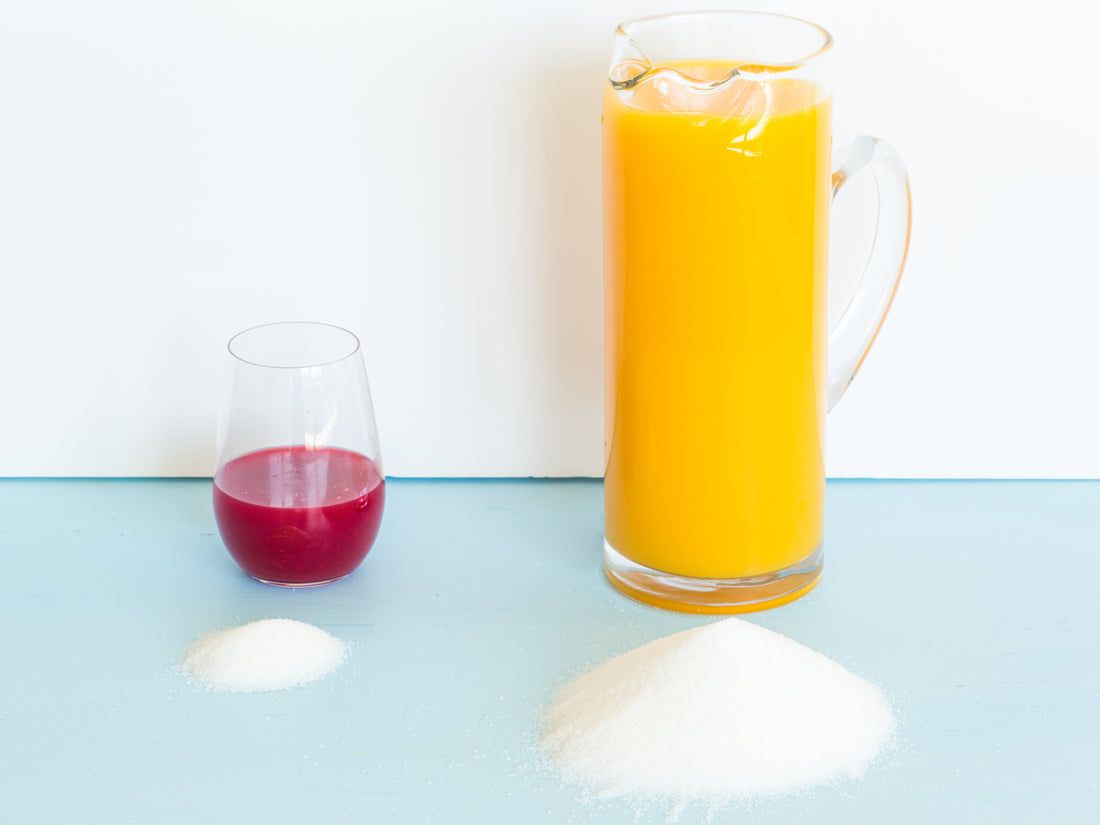In today’s media saturated with conflicting health messages, one message that has been amplified in recent times is the one that equates drinking fruit juice with drinking soft drinks, heavily laden with sugar.
For example, a widely circulated publication from the Washington Post recently said
“The truth is that fruit juice, even if it is freshly pressed, 100 percent juice, is little more than sugar water.[1]”
This is demonstrably not the case with orange juice. As most home juicers of oranges would agree, when you ream half an orange all that’s left is the inedible skin and very little pith and flesh. Depending on what juicer used, the vast majority of the fibre from the segments and flesh ends up as “pulp” in the juice, contributing to your fibre intake. With oranges there is very little in oranges that does not make its way into the juice.
This leads to the key message to take away in the great juice debate – orange juice, freshly squeezed from the fruit and consumed immediately, has virtually ALL of the nutrients of the fruit.
Orange juice is not just fructose and water!
Citrus fruits are packed with complex phytochemistry that has evolved alongside the animals that consumed them for thousands of generations. Phytonutrients in fruits and vegetables do things that plain sugar and orange flavourings do not. They speak to our biology. They coax our genes into being expressed in different quantities, raising some enzyme activity and lowering others.
These phytonutrients do not have calories, or fat or protein, but what they do affect the way our macronutrients are metabolised. They can also dampen inflammation and boost immunity. Phytonutrients play a huge role in ensuring that the cellular machinery in our bodies is operating as it should. In many years to come, many of these phytonutrients will be discovered to be essential to avoid debilitating diseases and raised to Vitamin status.
Many studies have looked at the consumption orange juice. In one study that involved more than 1 million consumers, the researchers found that moderate intake (up to 220 mls of juice a day) was not associated with diabetes or increased risk of developing diabetes[2].
In the area of weight gain, may of the studies are confounded by the type of juice used. Few studies have considered the specific impact of 100% juice as opposed to juice drinks. In those studies that did look at 100% orange juice consumption, such as a number which were conducted in Europe[3], there was no reported association between consumption of 100% fruit juices and body mass index of respondents[4].
Yet another study examined the addition of a massive 1.3L a day of 100% orange juice. This represented 112g of additional sugar in their diet. The predicted weight gain was 855g. When orange juice was consumed between meals fat mass did increase by 1kg on average. However when the orange juice was consumed with meals and not between meals, average fat mass decreased by 2.5kg[5]. Glycemic control functioned better when orange juice was consumed with a meal.
In addition to the amount and timing of consumption, the quality of the juice consumed also has an effect. Juices exist on a spectrum. At one end you have freshly squeezed 100% juice. At the other end lie the reconstituted juices and fruit drinks. This is what you get when you buy a “fruit box” or likely any of the juices that sit unrefrigerated on supermarket shelves. The latter have been heat treated such that many of the phytonutrients and enzymes lose their biological activity or are destroyed entirely. A good rule of thumb is if it has to be refrigerated, its probably bioactive and lightly treated enough for the phytonutrients to be bioavailable.
Still not convinced? Still want to avoid sugar in orange juice but get the health benefits?
Well one way of at least minimising the sugar content of your orange juice is to switch to a variety that has a higher ratio of phytonutrients to sugar.
A health report published by Redbelly Citrus together with Kathleen Alleaume, Nutritionist, Exercise Physiologist, explored the key components of blood oranges and noted that they have 10 times the antioxidant quenching capacity of navel oranges[6] and that the health benefits of blood oranges extended to those who consumed blood oranges through the form of juice[7]. Not only do they have higher antioxidants, but they also have around 20% less sugar.
Len Mancini, Director Redbelly Citrus:
“Just one blood orange can deliver an antioxidant punch of over 2kg of navel oranges. Put another way one glass of blood orange juice has the same antioxidant capacity of 2.5L of fresh navel juice. Plus it will have less sugar overall when compared to the same volume of navel juice. It’s a win/win.
For those consumers that count every gram of sugar in their diets, including from fruits and vegetables, the consumption of blood oranges during the Aussie blood orange season represents a great advantage over regular oranges.
Len Mancini:
“If you are worried about sugar, one way you can reduce the sugar in your diet without sacrificing your nutrition is to by choose blood oranges over navels or valencias. For example, the sugar in one glass (200mls) of freshly squeezed blood orange juice has 20g of sugar roughly. Compare that to the 200g of sugar you would need to consume if you consumed 10 times the amount in freshly squeezed navel juice.
One study reported in the Redbelly Health Report indicated that drinking 750mls (3 glasses) of blood orange juice a day didn’t lead to any weight gain when combined with a normal diet[8]. To the contrary, the unique combination of phenolics in blood orange juice actually lead to weight loss among the participants. Similar findings have been replicated several times in mouse studies which actually showed that unlimited access to blood orange juice actually prevented the onset of obesity and fatty liver when compared to mice that were given water or navel orange juice. Interestingly the groups given water only ended up fatter than those on either fruit juice.
So the next time you consider consuming juice, first, question the quality of the juice, is it fresh and untreated? Then question the fruit itself, is it one where the nutrients flow through to the juice. Then consider am I having the juice with food? If the answers to these questions are all yes, like in the case of a glass of freshly squeezed orange juice consumed with a meal, go for it. You will be healthier for it.
[1] https://www.washingtonpost.com/posteverything/wp/2017/04/26/people-think-juice-is-good-for-them-theyre-wrong/?noredirect=on&utm_term=.1ab76c3b69c1
[2] Associations of 100% fruit juice versus whole fruit with hypertension and diabetes risk in postmenopausal women: Results from the Women's Health Initiative. Prev Med. 105: 212-218
[3] Celis-Morales C et al. (2017) Correlates of overall and central obesity in adults from seven European countries: findings from the Food4Me Study. Eur J Clin Nutr.
[4] InterAct Consortium (2013) Consumption of sweet beverages and type 2 diabetes incidence in European adults: Results from EPIC-InterAct. Diabetologia 56: 1520–1530.
[5] Hägele FA et al. (2018) High orange juice consumption with or in-between three meals a day differently affects energy balance in healthy subjects. Nutr Diabetes 8(1): 19.
2 Antioxidant Effectiveness As Influenced by Phenolic Content of Fresh Orange Juices; Rapisardi, P, Tomaino, Antonio, Lo Cascio, Rossella, Bonina, Francesco, De Pasquale, Anna, Saija, Antonella, J. Agric. Food Chem. 1999, 47, 4718−4723
[7] http://redbellycitrus.com.au/wp-content/uploads/2017/07/Print-RedBelly_Health-Overview2017.pdf
[8] Red-fleshed sweet orange juice improves the risk factors for metabolic syndrome. Silveira JQ, Dourado GK, Cesar TB. International Journal of Food Science and Nutrition. 2015;66(7):830-6.

